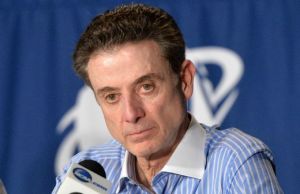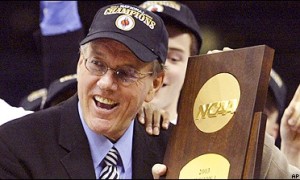
In the wake of the recent OTL (Outside the Lines) reports surfacing recently concerning the University of Louisville’s Mens Basketball team current and past scandal, I have become increasingly displeased with the way that NCAAMBB has handled scandal in the past. I would like to briefly examine the current state of College Basketball, and additionally I would like to explore examples of what CBB may or may not do in the future regarding rules and guidelines.
Most CBB scandal stories all break out the same, headlines of academic fraud, point shaving, boosters overstepping their bounds, or a negligent coach flood the sports networks, and sometimes even larger news outlets. Little information is available at first, but speculation is widespread. As more information spills out over time, these stories either blow up and take the program with it, or fizzle up and die (rarely)
“What is a head coach’s responsibility for ensuring NCAA violations do not occur within his or her program?
NCAA Division I Bylaw 11.1.1.1 states that an institution’s head coach is presumed to be responsible for the actions of all assistant coaches and administrators who report, directly or indirectly, to the head coach. A head coach shall promote an atmosphere of compliance within his or her program and shall monitor the activities of all assistant coaches and administrators involved with the program who report, directly or indirectly, to the coach.”
This is what you will find when you delve into the new set of NCAA Bylaw’s. This rule took effect in October of 2012, and since then coaches have been held accountable for everything that happens concerning their program. This is where I would like to step in. Personally, I believe this rule is ridiculous. What this rule says to me, is that the coach of the team is the CEO of the program, and while I believe that coaches need to be held accountable about certain things, a CEO does not know everything happening at all times concerning every facet of his or her company, and why would they? There are so many levels in college athletics it would be insane to hold one person accountable for anything any player, grad assistant, assistant coach, or even a ball boy does. It does not make sense. I also believe that young men at 18 years of age, need guidance when they arrive at an unfamiliar destination, and I believe that the coaches should be ones to provide this. If developing young athletes is so important to the NCAA, I believe that background checks for coaching staff and staff with contact to the players should be much higher, because if we hold athletes to a different standard than regular students, people in contact with these athletes should also be held to a higher standard.
In this age of all college athletics, not just basketball, it seems as if scandal follows success. It just seems like a norm, “Oh a National Championship? Lets see if they gave out any t-shirts to this recruit who played 34 minutes this season. That’ll teach them.” AND EVERY OTHER TEAM IN THE COUNTRY. Recruiting is a highly competitive business, and there is no magic to how it is done. The
top 25-50 schools have already made their own lane, but what about the others? How do they separate themselves from 337 other D1 programs? I’d like to believe that it is all done according to NCAA rules, but I highly doubt it, and I can hardly blame the coaches if all they’re doing is giving out a t-shirt here and there. I also believe there is a fine line between a t-shirt and a sports car. I’m also not a CBB coach that walks that fine line every day of my life.
I would also like to echo an opinion post from
Arne Duncan on HuffingtonPost, and some of his thoughts about how we can clean up CBB: “Finally, it’s time to re-empower coaches but at the same time hold them to a higher standard of accountability. I would propose a grand bargain: When a program has a clean record and good outcomes, coaches should have more leeway to increase their contact with players in the offseason. We don’t now cap the amount of time that a star violinist practices with the orchestra or the lab time of a budding scientist.
But when programs show the wrong values and have terrible educational outcomes, coaches should be held personally responsible for their lack of leadership. They should be suspended, sanctioned, or barred. And if the coach jumps ship to a new team, the penalties should follow the coach–rather than punishing innocent players left in their wake.”
Bottom line, I (a 20 year old NCAA D3 basketball player) do not have the final answer on how to clean up CBB, but I do believe that the NCAA, as well as these universities, need to to a better job evaluating who they see fit to put in charge of these programs, as most of the public is tired of seeing a sweaty and worried coach on that podium apologizing for his actions in front of the NCAA background. The setting that we all as sports fans have become all too familiar with, Because at the end of the day, everyone wants to see this Jim Boehiem
and not this Jim Boeheim.

If you have any opinions about this topic, or suggestions, please let me know!



Interesting article! Before reading this I had not given much thought to the legal issues surrounding college athletics. Could you provide more information about the rules for recruiting are and why giving out t-shirts would be a big deal? As someone who is not well informed about athletics this would be very helpful!
LikeLike
This is really interesting. You make a good point about holding coaches to a higher standard. I hope in a later article you’ll tell us your thoughts about paying college athletes.
LikeLike
Great post Tyler! This gives the non student athlete a little more insight on the complicated world of NCAA recruiting. Also I agree with you about the whole t-shirt sports car thing, at the end of the day a $10 shirt is not going to convince an athlete to come to the school, a good tour and welcoming environment helps, but at the end of the day I believe the student athletes choice is based on if he or she sees themselves succeeding in both the classroom and in athletics at that institution.
LikeLike
Great article! As a NCAA player myself I feel that the lines of these rules are very tough to be around for a head coach, you cant control everything around your players and don’t think they should be held accountable for everything around their players, This was a very informing article I think it can help players coaches and even the outsiders of sports. Great read 😉
LikeLike
Good post! Just give us more information about what happened at the beginning and I will follow you through the entire post – because it is well written, you bring in different sources. Good quotes of other sources – well thought out – and nice that you admit you’re a young’in. That is endearing. Remember the context! Many of us out here are not sports fans but we sure do like a good story.
LikeLike
I love how much information you put in the post. From the Outside the Lines report hyperlink, to the NCAA bylaws, to the Huffington post article, to your own opinions, to a related scandal; all of these seem to just further the points made by you. Very effective and very powerful due to your passion about the topic and how you do have a little skin in the game since you are a player. Slow down your thoughts though, just a little too quick in jumping topics because you feel so strongly about the situation. However, that is still a positive. Being passionate about what you post about will definitely increase readers.
LikeLike